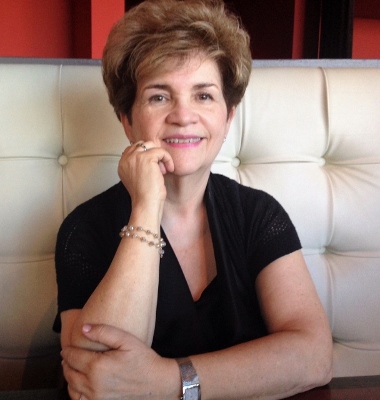Credit for banner image above: Humberto Calzada, Years of Judgment, 1990.
FIU's Cuban Research Institute (CRI) is pleased to provide support for FIU faculty and graduate students to present papers at academic conferences related to Cuba and its diaspora. The Eliana Rivero Scholarship in Cuban Studies will help to cover up to $500 per person to offset the costs of airfare, lodging, and meals to participate in a professional meeting. Award recipients must complete their travel by June 30 of the current year.
Application Materials
- A completed application and budget form available here
- A one-paragraph abstract of the proposed paper
- A brief description of the academic conference and how it will contribute to the applicant's professional development
- A copy of the applicant's curriculum vitae
All documents should be submitted to cri@fiu.edu.
Upon returning from their conference, recipients will submit a copy of their paper. Any publications resulting from this presentation should acknowledge the Eliana Rivero Research Scholarship in Cuban Studies and the Cuban Research Institute for their support.
About Eliana Rivero

Eliana Suárez Rivero was born in Artemisa, Cuba and immigrated permanently to the U.S. in 1961. She received her Ph.D. with distinction and M.A. in Hispanic language and literatures and a B.A. (magna cum laude) in Spanish language and literature from the University of Miami. Her scholarly work and teaching have specialized in Latin American literatures, especially poetry and women's writings, for almost five decades.
Dr. Rivero is professor emerita in the Department of Spanish and Portuguese at the University of Arizona in Tucson, where she taught Latin American and U.S. Latino/Latina literatures and cultures. She was also adjunct professor of women's studies and Latin American studies at her institution. She has authored or coedited seven scholarly books, and has published over 100 articles, chapters in books, review essays, notes, bibliographies, and collection entries, on topics ranging from Caribbean authors to Mexican colonial nuns.
Dr. Rivero is coeditor of Let's Hear Their Voices: Cuban American Writers of the Second Generation (2019); Telling To Live: Latina Feminist Testimonios (2001); Infinite Divisions: An Anthology of Chicana Literature (1995); and Siete poetas (1977). Her bilingual collection of essays, Discursos desde la diáspora, was published in 2005. Her Obra selecta (Selected Works, 2020) is a compilation of her best essays on Cuban national identity, Latin Americans in the United States, and feminism through literature, especially through poetry. Her own poetry was gathered in Collected Poems of Eliana Rivero (2005) and anthologized in Catedral sumergida: Poesía cubana contemporánea escrita por mujeres, edited by Ileana Álvarez and Maylén Domínguez (2013). Her video Melodías y memorias de Eliana Rivero, with her performance of traditional Cuban music and autobiographical commentary, was released in 2015. In 2022, the Cuban Research Institute dedicated its biennial conference to her in recognition of her valuable contributions to Cuban and Latino cultural studies.
Dr. Rivero lives in Tucson, Arizona, where she enjoys playing her grand piano every day.
Past Awards
The following scholars and graduate students have received travel grants to support their work in Cuban and Cuban American studies in recent years:
- Dr. Elaine Acosta González, CRI visiting scholar, "Hispanic, Latino, Latinx? When Do Hispanic Caribbean Migrants and Their Descendants in the U.S. Adopt a Pan-Ethnic Identity?" and "Forging Pan-Ethnic Allegiances: Hispanic Caribbean Communities in Three Gateway Cities—Miami, New York City, and Orlando" (2023 and 2024)
- Katie Coldiron, outreach program manager, Digital Library of the Caribbean, and Ph.D. student in history, "Un nido de espías: A History of Cuban Research at Florida International University" and "El Laboratorio: Latin American Studies in Miami" (2023 and 2024)
- Richard Denis, Ph.D. student in history, "Confronting Authoritarianism: Cuban Print Media and the Politics of the Press, 1952–1958" (2023)
- John Ermer, Ph.D. candidate in history, "The Cuban Mahjar: Law, Identity, and Belonging among Lebanese and Syrian Migrants to Cuba, 1880–1980" (2019)
- Leonardo Falcón, Ph.D. candidate in history, "Manufacturing Sin: Francisco Carranco and the Establishment of the Inquisition in Cuba and the Caribbean, 1595–1614" (2018)
- Maikel Fariñas Borrego, Ph.D. student in history, University of North Carolina, Chapel Hill, "Envisioning Capitalist Alternatives: The Emergence of Urban Entrepreneurs and the Politics of Influence in Cuba, 1920–1958" (2016)
- Jeniffer Fernández, Ph.D. candidate in modern languages, "Ritual and Magico-Religious Representations of Afro-Cuban Culture in 20th-Century Cuban Theater" (2019)
- Gina Gómez, Ph.D. student in global and sociocultural studies, "Hispanic, Latino, Latinx? When Do Hispanic Caribbean Migrants and Their Descendants in the U.S. Adopt a Pan-Ethnic Identity?" (2024)
- Verónica González and Ximena Valdivia, librarians, FIU Green Library, and master's students in Latin American and Caribbean studies, "Unlocking the Rhythm: Enhancing Access to Cuba's Musical Heritage through Transformative and Inclusive Archival Practices" (2024)
- Dr. Catherine Mas, assistant professor of history, "Cuban Apes, American Empire, and the Ethical Frontiers of Medical Research" (2024)
- Michele Mileusnich, Ph.D. student in modern languages, "Food and Cuban National Identity" (2023)
- Maite Morales, Ph.D. candidate in history, "Communal Desires: Cuban Consumption and Nostalgia, 1972–Present" (2018)
- Dr. Daniel Pedreira, adjunct professor of politics and international relations, "Chinese Vases in Latin America: Former Presidents as Agents of Democracy" (2023)
- Ariel Pérez Lazo, Ph.D. student in modern languages, "The Discussion of Identity in Cuba (1923–1956) and Its Relationship with Latin America: Its Repercussion to the Present" (2024)
- Elisa Rómulo Borges, Ph.D. student in global and sociocultural studies, "Forging Pan-Ethnic Allegiances: Hispanic Caribbean Communities in Three Gateway Cities—Miami, New York City, and Orlando" and "Hispanic, Latino, Latinx? When Do Hispanic Caribbean Migrants and Their Descendants in the U.S. Adopt a Pan-Ethnic Identity?" (2023 and 2024)
- Alberto Sosa Cabanas, Ph.D. candidate in modern languages, "Racism, Celebration, and Otherness: Depictions of Blackness in Cuban Cultural Discourse (1790–1959)" (2017)
- Jack Vertovec, Ph.D. candidate in global and sociocultural studies, "Entrepreneurial Intersections: An Ethnographic Study of Structural Conditions and Economic Practices in Contemporary Cuba" (2018)